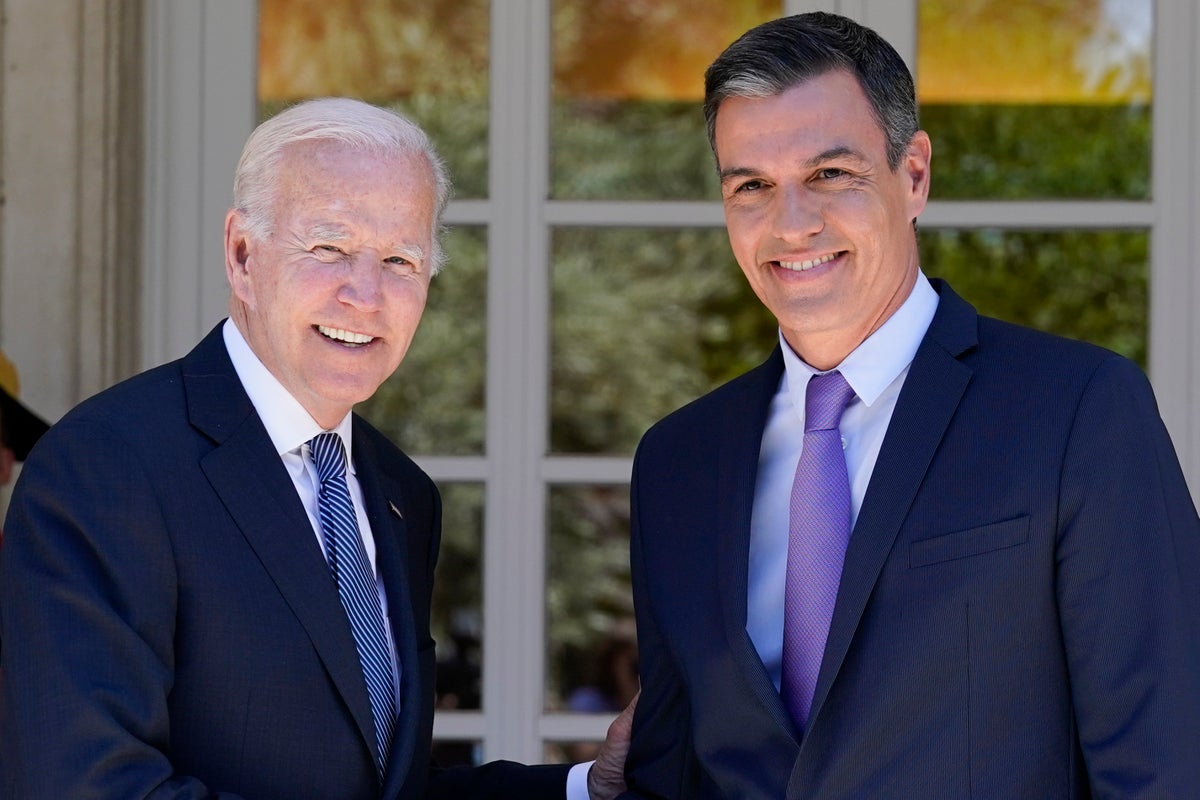
President Joe Biden and Spanish Prime Minister Pedro Sánchez are set to hold talks Friday as their countries are collaborating along with Canada to establish migration hubs in Latin America where asylum seekers fleeing poverty and violence in their home countries can go to apply for protection.
The two leaders are also expected to discuss Russia’s ongoing invasion of Ukraine, climate change and other issues. But efforts by the U.S. and Spain to cooperate on asylum processing will loom large over the White House talks as the Biden administration rolls out new immigration measures now that COVID-19 immigration restrictions have ended. The changes could fundamentally alter how migrants arrive at the U.S.-Mexico border.
The new efforts are designed to crack down on illegal crossings while opening up legal pathways meant to incentivize migrants to apply for asylum online where they are, instead of making the dangerous and often deadly journey to the border. Those caught illegally crossing the southern U.S. border cannot return for five years and they face criminal prosecution if they do. And migrants will be barred from seeking asylum at the border if they did not first ask for protection in a country they traveled through, or apply online.
A major piece of the expanded legal pathway is the creation of processing centers in Colombia and Guatemala and up to 100 others in the Western Hemisphere where migrants can go to apply to come to the U.S., Spain or Canada.
It was a huge boon for the White House to get Spain and Canada to agree to take in asylum seekers from Latin America. And it helps reinforce the Biden administration’s argument that the current migration quandary facing the Americas is a global problem that needs a global solution — much like the refugee crises that have impacted Syria, Afghanistan and Ukraine in recent years.
The U.S. has increasingly seen migrants arrive at its Southern border who are from China, Ukraine, Haiti, Russia and other nations far from Latin America, and who are increasingly family groups and children traveling alone. Thirty years ago, by contrast, illegal crossings were almost always single adults from Mexico who were easily returned back over the border.
Spain, like many other nations globally, needs workers, and it will be able to choose migrants who have skills needed in the country. The Spanish ministry has said the pathway will only apply to those who have already received international protection status. That means the migrants it accepts will need to be considered refugees and will be treated in much the same way that Syrian asylum seekers, coming via Turkey, have been treated by Spain.
Plans for the processing centers to be established in Guatemala and Colombia were announced last month, but the centers have yet to begin operating. Once up and running, they are expected to process thousands of applicants a month. United Nations organizations will operate the centers, but U.S. officials will be present as well to help with processing of applications.
While Biden predicted this week that the situation at the border could be “chaotic for a while,” his administration is looking to discourage migrants from paying smuggling operations to help them journey to the U.S., particularly through the Darien Gap. Officials hope that by both cracking down at the border and opening up other ways to the U.S., they will be able to bring a measure of order to the U.S.-Mexico border that has seen record crossings in recent years.
The pandemic restrictions, known as Title 42, were a Trump administration endeavor that went into effect in March 2020 amid the global pandemic. It allowed border officials to turn away migrants to help stop the spread of COVID-19. But there were concerns the policies were put into place merely to keep people out.
While Title 42 was used to deny asylum more than 2.8 million times, it carried no legal consequences, which encouraged repeat attempts by migrants to enter the U.S. The public health emergency officially ended on Thursday night, and with it the restrictions.
Russia’s invasion of Ukraine is also expected to be high on the agenda for Biden and Sánchez , two NATO allies.
Sánchez is expected to discuss with Biden his recent talks with Chinese President Xi Jinping and Brazilian President Luiz Inácio Lula da Silva, both of whom have put forward ideas to end the conflict. Sánchez is expected to urge Biden to take into account the opinions of other countries affected by the war outside of Europe.







